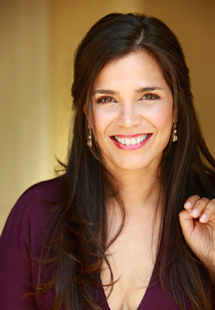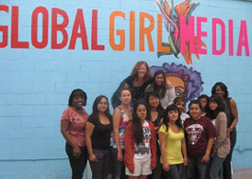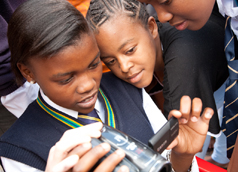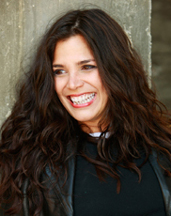"I have always been motivated by the desire to improve the world for women, in particular in the media -- because the media is the "face" of the collective philosophy; watching media tells you what we think of ourselves and our "ideal" images and states of being. Right now women's place within that context is deeply troubling on a symbolic level and this translates to trouble for women in society and all over the world, as media is our most powerful export."
-- Kamala Lopez, U.S. Program Director of Global Girl Media
 Kamala Lopez, U.S. Program Director for Global Girl Media, is on a mission to nurture the voices and self-expression of young women in underserved communities and developing nations to speak out about the issues that affect them most. Global Girl Media is a nonprofit organization that links young women, ages 14-20, with seasoned broadcast and print journalists, documentary filmmakers, and digital media professionals with the bigger goal of inspiring the future generation of female citizen broadcast journalists. Currently, Global Girl Media is training 20 girls in Soweto, South Africa and 10 girls in Los Angeles.
Kamala Lopez, U.S. Program Director for Global Girl Media, is on a mission to nurture the voices and self-expression of young women in underserved communities and developing nations to speak out about the issues that affect them most. Global Girl Media is a nonprofit organization that links young women, ages 14-20, with seasoned broadcast and print journalists, documentary filmmakers, and digital media professionals with the bigger goal of inspiring the future generation of female citizen broadcast journalists. Currently, Global Girl Media is training 20 girls in Soweto, South Africa and 10 girls in Los Angeles.
My Interview with Kamala Lopez:
TB: What inspires you to do this work?
KL: I am inspired by the reality that actions we take in the real world, no matter how seemingly small, can have impact on people's lives in a positive way. I have always been motivated by the desire to improve the world for women, in particular in the media -- because the media is the "face" of the collective philosophy; watching media tells you what we think of ourselves and our "ideal" images and states of being. Right now women's place within that context is deeply troubling on a symbolic level and this translates to trouble for women in society and all over the world, as media is our most powerful export.
TB: Is there anything else that motivates you?
KL: I also love the spirit of young girls and women and try to keep that spirit alive in my life and in my own personality as well as facilitate that spirit to have a place of respect and honor in our society. I am a firm believer that if we turned the running of the world over to the women things would improve markedly in many of the areas in which we find ourselves in trouble: war, poverty, hunger, illiteracy, sexual violence, prejudice, etc. I am not suggesting that there wouldn't be other problems that would arise, perhaps even female-centric weaknesses that would be negative when given free reign. However, it is clear to me that the imbalance of power between the genders is a major part of the world's problems right now. Anything out of balance is going to eventually be bad for us and presently the male energy and the worship of maleness is in fact a major contributor to the decaying state the world finds itself in. I could give you more analysis on this if needed, but I think it's pretty clear.
TB: Can you say more about women's place in the media being deeply troubling on a symbolic level?
KL: First of all, if you look at the media landscape -- what kind of women are being given the opportunity to be in media?
If you look at it, I would say in the world of narrative media there are certain female stereotypes that are always present. There's usually the young girl who is very beautiful and somewhat innocent and then comes along a love interest; then maybe they'll be a villainous [woman] who is overtly sexualized and uses her sexuality to manipulate men in some way or to achieve her agenda; and then there's the crone. The portrayals of women really haven't changed much in thousands of years.
I think just being out in the world as we are, we know so many more complex female characters -- women whose interests extend beyond men and clothing and how they look -- but these women are very rarely seen.
TB: How is the mission of Global Girl Media addressing this?
KL: The beauty of Global Girl Media is that the voice of the young woman -- the 14 to 20-year old woman -- is pretty much entirely absent in the social discourse. You do have some characters in bad television shows that are in that age range, but to actually hear the voices of these young women and what is concerning to them is extremely valuable to us in the society. Global Girl Media's entire purpose is to provide guidance and give a forum to that absent voice worldwide -- and to see whether giving that voice a platform will have an effect.
TB: Do you think it will?
 KL: Yes. What's been remarkable as we've been training our Global Girls is to hear the types of things these young women care about. For example, sexual violence, trafficking, peer pressure, eating disorders, immigration, the class wars, and race wars. You would never, ever guess this if you read Seventeen. You would think that what they care about is lip gloss, sandals, boys, and so forth -- which I am sure they do on some level -- but if you ask them what kinds of stories they want to tell, or what kinds of things are happening that they want to address, it's extremely profound stuff.
KL: Yes. What's been remarkable as we've been training our Global Girls is to hear the types of things these young women care about. For example, sexual violence, trafficking, peer pressure, eating disorders, immigration, the class wars, and race wars. You would never, ever guess this if you read Seventeen. You would think that what they care about is lip gloss, sandals, boys, and so forth -- which I am sure they do on some level -- but if you ask them what kinds of stories they want to tell, or what kinds of things are happening that they want to address, it's extremely profound stuff.
TB: Much deeper than the current media would have us believe.
KL: We've been led to believe that we have a very dumbed-down society -- and that people are not thinking and are just sort of interested in escapism. However, if you look at this young generation, what I've been noticing is that they are extremely compassionate. They are extremely globally aware and interested, and they want to participate in making the world a better place -- but they don't know how. As adults we are failing them by not providing them with any sort of guidance, any map, or any blueprint to do this stuff. That's precisely what Global Girl is about.
TB: So the idea is that as the voices of these young women are heard more, there will be more of an acceptance and understanding of their true concerns and values?
KL: Right now we are operating on the advertising industry's picture of a young teenage girl. The way we see teenage girls is based essentially on what products we are selling to them. But we are not really hearing from them at all. So when you do actually hear from them, you think, "Wow, that's a completely different picture than I am looking at." This is someone who is concerned about her mother, and how much her mother works every day. Concerned about her father who is drinking all of the time. Concerned about her older brother who dropped out of school and is now a gangster. These are serious things.
 This isn't only endemic to girls in the United States. These are issues that are affecting girls all over the world. Once these girls understand that they have these commonalities, and we can forge these alliances and build these bridges... Can you imagine in 10 years if we were to have 50 Global Girl Media News Bureaus operating in the most economically disadvantaged places in the world, and those girls connect and form almost a network of support, education, and power? Well suddenly we really are effecting change.
This isn't only endemic to girls in the United States. These are issues that are affecting girls all over the world. Once these girls understand that they have these commonalities, and we can forge these alliances and build these bridges... Can you imagine in 10 years if we were to have 50 Global Girl Media News Bureaus operating in the most economically disadvantaged places in the world, and those girls connect and form almost a network of support, education, and power? Well suddenly we really are effecting change.
TB: Yes, that would make real change.
KL: Amie Williams, who is the executive director of Global Girl Media, said when she was traveling and seeing news bureaus closing down everywhere, she thought to herself, Well, Global Girl Media is going to be opening up. We are going to be taking their place. Maybe CNN or ABC have to get out of Ramala, but we are going to go in.
We've left it in the hands of men for entirely to long. I love and adore men. I think their energy is so sexy, and fabulous, and active. But the imbalance in the male and female power is deadly. It is literally taking us to extinction.
TB: Tell me a little more about this.
KL: It's really about the immediate rush to action versus deliberation. For example, if we look at 9/11, some hideous people come and destroy the lives of thousands of people. What other response could we have had in that moment that would have kept the world on our side? What other response could we have had that would have built empathy and compassion and would have supported another way to go that wasn't about retaliation, revenge, and violence? There is another response. I believe if the female energy were more valued, that response would have been at least up for debate. Now any response that is not immediately aggressive is considered weak and a failure, and this is the shift we need to make.
TB: Do you think its important for adult women to be mentors to this younger generation?
KL: As conscious adult women, if we really do care about the state of girls and women worldwide, we need to train this next generation of girls because they are going to be the ones taking over and they are going to be the ones that shift this paradigm. Unfortunately for our generation, we've been raised in a society where greed trumps all. In other words, where the bottom line is money...where money affects how we perceive each other, and how we perceive ourselves and our value. We need to break that now with this younger generation.
I feel very strongly that it is that mentality that has led to the sort of breakdown that we are experiencing right now. If you make the measure of every single thing money, you end up with an extremely vacuous, and extremely dangerous place for human beings to live in because it doesn't allow for any other value system.

As conscious adult women, we need to instill a different value system. Actually, it is an innate value system. We need to tell the world that being compassionate about other people does not make you weak, and it is not intrinsically a female trait. It is a trait of the evolved human being, and it is a trait that we need to hold up as something of great worth. As women, we need to promote that, emphasize that, and nurture that. This is part of what we are doing with Global Girl Media.
TB: What have been some of the major challenges in building Global Girl Media?
KL: Our major challenge is funding. Everything else, no matter how impossible, I seem to be able to do pretty easily and I have a lot of fun doing it. For example, three weeks ago we didn't even have a space to work out of. Now we not only have a beautiful space, but we have the girls, the instructors, and I have a wonderful young woman, Daniela Choclan, helping me.
TB: Tell me more about the funding that you need.
KL: Right now we need about 80K for the Los Angeles program to pay for cameras and other film and sound equipment, internet, editing, meals, transportation, other staff, utilities, and other hard goods such as paper, pens, etc.
TB: How can people contribute?

KM: People can donate on the website at www.globalgirlmedia.org. All of the donations right now will go to the Los Angeles-based program, since the South Africa program is already funded. Anything from a dollar to a million, we'll take it gratefully and give you a sweet tax deduction. Equipment donations are also very needed and welcome. We need computers, cameras, microphones, tripods, and a van or some sort of vehicle where I can move a team of girls around to do stories. The goal is sustainability so that we can continue to train girls in Los Angeles at the rate of maybe 10 girls every six months.
TB: What are some important leadership lessons you've learned in doing this work and what advice can you share with other women?
KL: As far as leadership goes, it's important to know that we don't have to act like men to be leaders. Since men have been all we have had to look to as examples of leaders, that's how we think we have to act. But generally that's not how we have to act. We just have to act like ourselves. We do have to maintain a collaborative spirit. Also, at the end of the day you do have to step into your own power and say, "Okay, I've listened to all of these different opinions, advice, and so forth, but I am deciding this and this is how we are going to go." You have to get comfortable with that. Ultimately, women have to start to trust themselves more and believe that they know what they are doing, and do it.
TB: So true. How can we as women help each other?
To learn more about Global Girl Media, you can visit www.globalgirlmedia.org.
